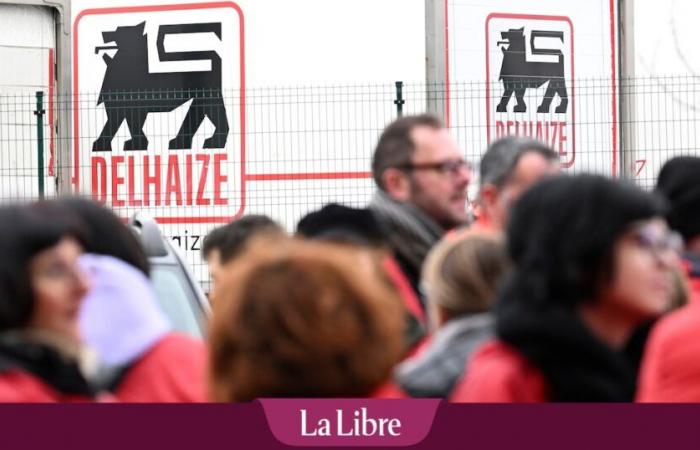“This is an important decisioncontinues Ms. Carbonero. We hope that it will set a precedent and give pause to judges who tend to agree with employers a little too quickly.”
“It is not normal for the courts to intervene in collective disputes, but we are satisfied with the decision rendered.”says Jean-François Libotte, legal advisor to the CNE (Christian union). “We hope that this judgment will be taken into account in the legal conflicts still ongoing in the Delhaize case and in future social conflicts.”
All Delhaize stores are now franchised
Delhaize franchises its stores
To fully understand, we have to go back to March 2023 when Delhaize announced its desire to franchise its 128 Belgian supermarkets. The unions fear a sharp deterioration in staff working conditions and are organizing actions to block the group’s stores and depots as a protest.
To force the lifting of these strike pickets, Delhaize turned to the courts and filed “unilateral requests” before the courts of first instance. This procedure is very particular since the judge makes an urgent decision based solely on the point of view of the applicant (Delhaize), without allowing the opposing party (the unions) to defend themselves, therefore without contradictory debate.
gullIt has been demonstrated that the right to strike is indeed a fundamental right.
The law provides that a unilateral request is only admissible in cases of “absolute necessity”. Yet, “out of around thirty unilateral procedures introduced by Delhaize, to our knowledge, only one was refused in Antwerp and perhaps one or two elsewhere.laments Mr. Libotte. From the start of the conflict, the unions denounced the ease with which the judges ruled in favor of Delhaize.
“Ryanair and Delhaize behave almost mafia-like. They disregard Belgian law and our model of social consultation”
A Liège judge wonders
In Liège, as in many places in the Kingdom, the court of first instance issues orders favorable to the mass distribution group. The pickets must be lifted, under penalty of fines.
The unions then carry out an appeal procedure (third party opposition) against an order of August 11, 2023. They argue that the criteria justifying the “absolute necessity” of the unilateral request are not met. There are three criteria: the need to intervene in extreme urgency to avoid a serious and imminent danger, the need to intervene by surprise, and the impossibility of identifying the people targeted by the request.
The Court’s decision does not mean that a judge will never again be able to order the lifting of a picket line.
Before ruling on the merits, the president of the court of first instance of Liège poses a preliminary question to the Constitutional Court. He wants to know if the criteria establishing absolute necessity are not too restrictive, in particular with regard to property rights (that of Delhaize, in this case).
Some 450 job losses since the franchising of Delhaize stores, according to the CNE
The explicit ruling of the Constitutional Court
The Court’s response is unambiguous: “The restriction of the ability to act by unilateral request is justified by respect for the right to a fair trial. (via a contradictory debate), she judges. And to add, just as explicitly, that “the legitimate exercise of the right to strike does not in itself constitute a cause of absolute necessity”.
The Human Rights League, a stakeholder in the case, “welcomes this decision which reminds us that unilateral requests are of an exceptional nature […]. This restriction is precisely intended to protect fundamental rights, including the right to strike.according to Emmanuelle de Buisseret Hardy, legal advisor to the League.
The Court’s decision does not mean that a judge will never again be able to order the lifting of a picket line. But it can only do so after a contradictory debate (in summary proceedings, for example), or, at the very least, by firmly demonstrating that there is an absolute necessity to act via a unilateral procedure.
“If we were to strictly apply the criteria of absolute necessity, we can consider that no more unilateral requests will be accepted in peaceful social conflicts”Jean-François Libotte wants to believe. It will be up to the courts to decide.






